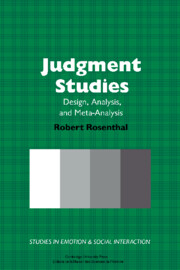Book contents
- Frontmatter
- Contents
- Preface
- PART I THE DESIGN OF JUDGMENT STUDIES
- PART II THE ANALYSIS OF JUDGMENT STUDIES
- 5 Forming composites and other redescriptions of variables
- 6 Significance testing and effect size estimation
- 7 The interpretation of interaction effects
- 8 Contrasts: focused comparisons in the analysis of data
- 9 Contrasts in repeated-measures designs
- PART III THE META-ANALYSIS OF JUDGMENT STUDIES
- Appendix Statistical tables
- References
- Name index
- Subject index
8 - Contrasts: focused comparisons in the analysis of data
Published online by Cambridge University Press: 06 November 2009
- Frontmatter
- Contents
- Preface
- PART I THE DESIGN OF JUDGMENT STUDIES
- PART II THE ANALYSIS OF JUDGMENT STUDIES
- 5 Forming composites and other redescriptions of variables
- 6 Significance testing and effect size estimation
- 7 The interpretation of interaction effects
- 8 Contrasts: focused comparisons in the analysis of data
- 9 Contrasts in repeated-measures designs
- PART III THE META-ANALYSIS OF JUDGMENT STUDIES
- Appendix Statistical tables
- References
- Name index
- Subject index
Summary
Focused F tests
Much of the business of research in nonverbal communication is carried out by means of analyses of variance which ordinarily culminate in one or more F tests that are often reported as “the results” of the research. The results, of course, are the entire table of means, the table of variance, the various tables of residuals, the effect size estimates, and much more. Here we focus only on the F tests themselves and how we can make them work harder for us. The rule of thumb is easy: Never (almost never) employ an F test in an analysis of variance, analysis of covariance, or multivariate analysis of variance that is unfocused, that is, that has more than a single df in the numerator of the F test when it is investigating some specific (or “fixed effect”) set of questions. In most cases, unfocused F's address questions in which we are not really interested, questions of the form: are there likely to be some differences of some kinds among some of the groups in our study? That is the kind of question we ask when we examine, for example, the decoding ability of judges at five age levels and report the F for age levels with 4 df in the numerator.
- Type
- Chapter
- Information
- Judgment StudiesDesign, Analysis, and Meta-Analysis, pp. 136 - 158Publisher: Cambridge University PressPrint publication year: 1987

